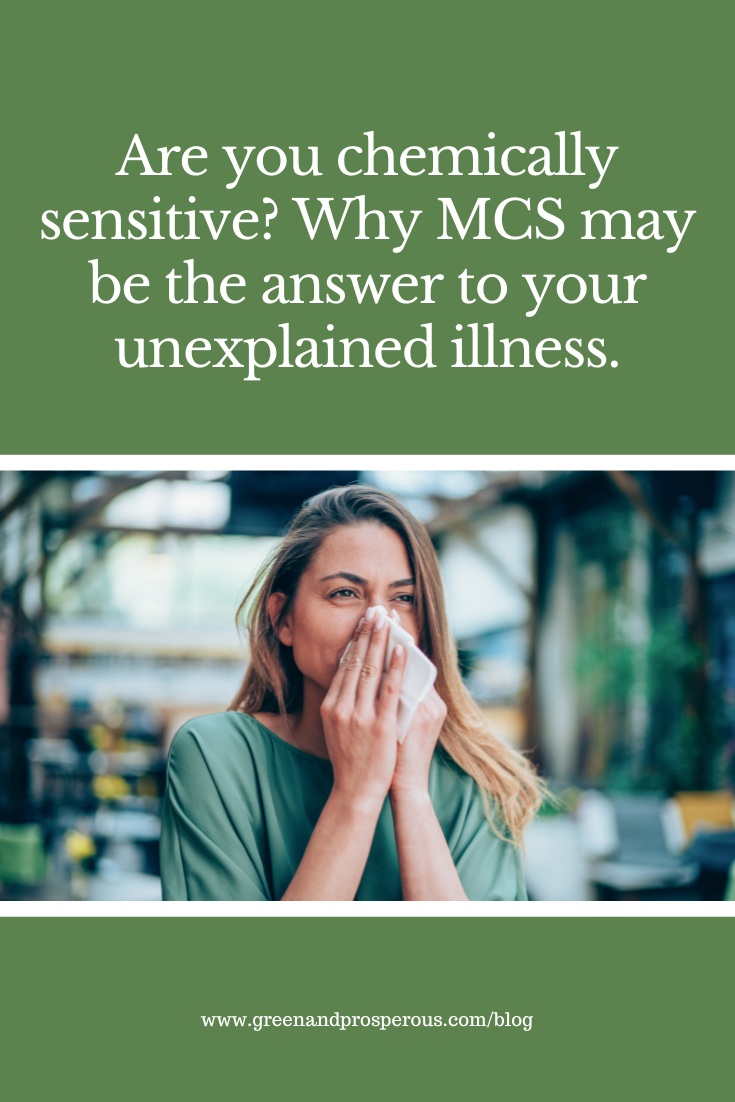Are you chemically sensitive? Why MCS may be the answer to your unexplained illness.
/While working on a blog post about one woman’s experience of debilitating illness after being exposed to toxic chemicals, I realized that at the heart of this story is an issue that is poorly understood, and under-discussed within the medical industry. It’s called Multiple Chemical Sensitivity (MCS), and no one really knows how many people are affected by it. Basically, it is a chronic medical condition in which a person becomes sick, or exhibits allergy-like reactions to chemicals that he or she has become exposed to at doses that are generally considered safe for humans.
There are a lot of misunderstandings about and extreme reactions to this condition on both sides of the debate. This post discusses some things you should consider if you suspect that you might be suffering from MCS.
Multiple Chemical Sensitivity was first identified by Dr. Theron Randolph in the early 1950s. Dr. Randolph linked MCS to the increasing use of toxic chemicals in the environment, including pesticides in food, heavy metals in water, vehicle exhaust in the air, and synthetic chemicals in personal care products, household cleaning supplies, and building materials. Then, as now, clinicians, researchers and policymakers have used various names for MCS, such as idiopathic environmental intolerance (IEI), environmental illness (EI), and environmental sensitivity (ES). They have also expressed a range of views about MCS, including whether or not it is a physiological disease or psychopathological syndrome, and how seriously it should be taken as a medically unexplained illness (MUI). Some have even confused MCS with allergies, although there are important differences that distinguish these two.
First, allergies are usually specific to one substance or class of substances, while the triggers for MCS may be various chemically unrelated substances. However, one Korean study published in 2014 shows that patients suffering from allergies had a higher incidence of MCS, perhaps because these patients had a heightened sensitivity to chemicals. Also, it is easier to diagnose and treat allergies; MCS is often misdiagnosed. Next, unlike with allergies, reactions in individuals suffering from MCS can’t be medicated. Instead, complete avoidance of the triggers is the only remedy for relief. Finally, the symptoms of allergies are fairly consistent and specific: people experiencing allergic reactions may develop asthma; dry, red, and/or itchy skin; watery eyes; hives or rash; nasal problems; headaches; fatigue; or emotional irritability. By contrast, two people suffering from MCS may develop very different reactions to the same triggers, and these reactions may be non-specific or inconsistent. Alternatively, reactions may become worse over time. In part because of these characteristics of MCS, the medical, policy-making, and activist communities have had varying attitudes towards the idea that a person’s environment can make him or her very sick or ill at ease, while others experiencing that same environment have no such reactions.
In the US, the lines of debate are clearly divided, with most medical professionals and commercial interests dismissive of MCS as a purely psychosomatic ailment (i.e. “it’s all in your head”). However, the US Environmental Protection Agency and US Consumer Product Safety Commission have each ruled that MCS is not psychosomatic and should be diagnosed and treated like any other health disorder. MCS/EI is covered under the Americans with Disabilities Act, but with many restrictions that can make enforcement of the Act’s provisions difficult. On the other hand, the CDC (Centers for Disease Control) does not formally recognize MCS, but does issue warnings about the use of certain personal care products (e.g. colognes, perfumes, essential oils and scented skin and hair products) and their potential effects on co-workers in CDC buildings. These products should not be brought into, used, or otherwise applied at or near actual workstations, in restrooms, or anywhere in CDC facilities. Many have interpreted this as a tacit acceptance of MCS as a real ailment, one that does not bind the CDC legally.
In Canada, too (where MCS is more commonly referred to as ES), there are laws that seek to indirectly address the problem by recognizing the rights of people with disabilities in the workplace. A report by the Canadian Human Rights Commission, as noted by The David Suzuki Foundation, says that suffering individuals are entitled to the protection of the Canadian Human Rights Act. Australia, too, takes a broad-based approach to MCS and readily accepts its reality as a physical, not psychosomatic, ailment. In the US, Canada, and Australia, environmental-minded non-profit organizations readily advocate for greater recognition of MCS. However, in the US, the pushback from the medical and chemical industries and their representatives seems to be the most acute, with some even opposing a national discussion of the problem. So why is there such reluctance to acknowledge MCS as a serious, physiological ailment?
That reluctance, or opposition, usually points to three lines of objection. First, many of those who oppose treating MCS as a real disease cite the potential abuses of disability benefits, or the legal system (i.e. filing lawsuits), by those claiming deceptively or erroneously to suffer from MCS. Next, the scientific/medical community continues to believe in the absolute “objectivity” of science, and MCS often defies scientific and clinical explanation. Finally, the chemical manufacturing industry works to protect their financial interests and to decrease the potential for legal liabilities by frequently attacking MCS, labeling sufferers as “neurotic” or “lazy”, the doctors who diagnose them as “quacks”, and scientific studies supporting the evidence for MCS as “flawed”. They employ the services of physicians and medical experts to write and testify against MCS in order to create the impression that it should not be taken seriously.
However, an increasing number of people around the world complain of chemical sensitivity in some form or another. You may be one of them. So what you should do if you suspect you are suffering from MCS?
First, try eliminating all sources of harmful chemicals from your household, and switch to non-toxic varieties. The Green and Prosperous “recommended products” page contains some suggestions for non-toxic alternatives. Second, since the list of possible symptoms is virtually endless, you should keep a food and/or chemical exposure diary to determine what your triggers are. You should also keep a record of any new products you have used, or whether you have been sleeping in a new bed, or sitting in a new chair. These kinds of items are often overlooked as sources of chemical sensitivity. Third, you can go for allergy testing. If the tests come back negative, there is a good chance that you are suffering from MCS or some other form of chemical sensitivity. Fourth, if none of the above suggestions have relieved your symptoms or revealed the source of the problem, you should consult a physician who specializes in MCS. There are several organizations that can provide referrals. In the United States, consult MCS Referral & Resources. One blogger has provided a list of physicians who understand and treat MCS here. Another has provided a global list that covers the US, UK, and Australia.
image courtesy of freeimages.com/pcst
Like this? Please pin!






































